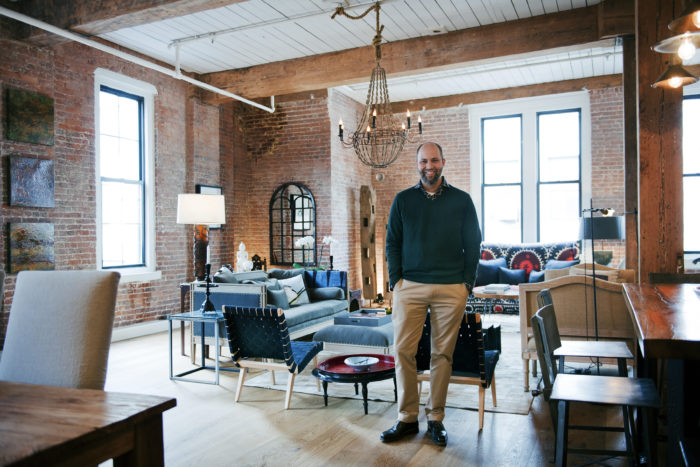As president of the home-furnishings brand West Elm, Jim Brett has had an ideal Brooklyn lifestyle. His office is in West Elm’s sleek new headquarters in Dumbo’s refurbished Empire Stores, his home is nearby, and he finds inspiration in such borough venues as Brooklyn Flea. But starting next month he’ll become a commuter, taking his talents to Manhattan in his new job as CEO of the iconic clothier J. Crew. His hiring, announced Monday, shook up an already beleaguered apparel industry, in part because he will take over from the legendary “merchant prince,” Mickey Drexler, who had struggled to turn around the once-high-flying company.
Brett will have his work cut out for him. The retail industry is reeling, with thousands of store closures in the U.S. among merchants of all kinds, including Macy’s, JCPenney, Staples and Radio Shack. The Limited and American Apparel have closed for good. Part of the reason for the carnage is competition from E-commerce, and part a slowness to adapt to changing tastes and shopping styles. “I just think this is a horrible business,” financial commentator Jim Cramer declared today on CNBC. “And it was not a horrible business. And I don’t know who can solve this conundrum. This is where the weakness is at the mall–it’s apparel.”
J. Crew’s board evidently believed that the person with the solutions is Brett, given his performance at West Elm. In his seven years as president, he transformed the company from an uninspired, money-losing brand to the fastest-growing division of Williams-Sonoma, its parent company. Brett appears to believe that J. Crew, which once had wide appeal, can be redeemed. In a statement, he said: “J. Crew has tremendous opportunity to play a more meaningful role in our lives, and I look forward to leading it through its next phase of growth.”
Mickey Drexler, departing CEO of J. Crew Group, in the company’s flagship Madewell store (Photo by Clement Pascal/The New York Times/Redux)
On his path to West Elm, Brett took part in some of the hottest retail growth stories. As an executive for Anthropologie and later Urban Outfitters, he honed his taste and “his expertise in merchandising a gentrified bohemian lifestyle to bourgeois consumers,” observed writer Dan Shaw in the New York Times. Brett showed a knack for mixing industrial-inspired furnishings with handcrafted ceramics and textiles.
The West Elm Renaissance
When Brett arrived at West Elm, which had opened its first store in 2003 in Dumbo, he found the products to be drab and spiritless. “The whole brand was brown boxes made in China. There wasn’t a curve in the store,” Brett told Fast Company. He fixed the product line by seeking out craftspeople worldwide for inspiration and handiwork, with a commitment to Fair Trade Certified products. He changed the mood of the stores by adopting a local-shopkeeper ethos, with in-store events and collaborations. In recent years, West Elm has grown significantly and launched West Elm Workspace, which provides furnishings for offices, and West Elm Hotels.
Brett was known at West Elm for doing much of the scouting himself. Chrissy Fichtl, founder of Apotheke, a successful soap-and-candle maker in Red Hook, tells about an encounter with Brett that helped launch her business. One summer day in 2013, Brett walked up to her booth at Brooklyn Flea and told her he was developing a concept store to sell Brooklyn products. She gave him a soap and a candle to sample. “Three days later, I had a big enough order [2,500 candles, 5,000 soaps] to get a factory,” Fichtl said.
J. Crew’s Rise and Fall
At J. Crew, Brett will have big shoes to fill, and a rocky road. Drexler is a retailing genius who had grown The Gap into a giant (before getting bounced as CEO in a sales slump) and had turned J. Crew into an All-American fashion brand worn by the likes of Michelle Obama. Lately, however, a strategy that took J. Crew into more fashion-forward styles and higher prices ($800 skirts, $$1,900 sweaters) led to 10 straight financial quarters of declining same-store sales. On top of that trend, J. Crew is burdened with more than $2 billion of debt, a hangover from a leveraged buyout in 2011. In an interview with the Wall Street Journal just last month, Drexler admitted that the company had become too “elitist” and had failed to keep up with competition from faster, cheaper, digitally driven merchants.
Drexler, who owns 10% of the company, will stay on as chairman. Of his successor, he stated: “Jim has a proven track record of pushing for innovation and growing omni-channel brands.” (J. Crew owns Madewell, a successful women’s clothing line that has focused on staying hip and affordable.) Back at West Elm, parent company Williams-Sonoma announced that Brett will be succeeded by Alex Bellos, who had served an earlier stint at West Elm and currently heads the Williams-Sonoma brands Rejuvention (lighting and home products) and Mark and Graham (bags and accessories). He currently resides in the other Brooklyn: Portland, OR.
